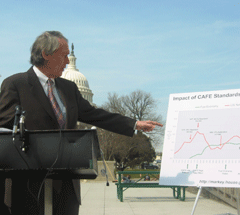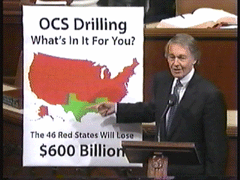Climate Committee
Air Date: Week of March 23, 2007

Rep. Ed Markey (D-MA), and Rep. Todd Russell Platts (R-PA) introduced legislation that will require vehicles to improve their fuel economy standards by at least 4 percent every year, reaching 35 miles per gallon by 2018. (Courtesy U.S. House of Representatives)
When Speaker of the House Nancy Pelosi created the House Select Committee on Energy Independence and Global Warming, she named Massachusetts Democrat Edward Markey as chair. Many will be looking to see just how much Markey's committee can accomplish before it expires in the fall of 2008. Congressman Ed Markey joins Living on Earth from his office in Washington, D.C.
Transcript
GELLERMAN: Speaker of the House Nancy Pelosi has put global warming and energy independence on the front burner and fast track. But infighting among powerful House committees threatens to bog the process down. So Pelosi has created a new committee to speed things up. The House Select Committee on Energy Independence and Global Warming is chaired by Massachusetts Democrat Edward Markey. He joins us from his office on Capitol Hill. And hello, Congressman Markey.
MARKEY: Thank you for having me.
GELLERMAN: The committee that you now head doesn’t have the power to actually draft legislation. So what are you actually designed to do?
MARKEY: Well, first to revive the public interest in taking bold and effective action to find solutions to the looming catastrophe of climate change. That’s after six years of Republican denial controlling the House, the Senate, and the Presidency. And obviously there’s a lot of education that needs to take place.
Then to recommend strategies in one reducing our addiction to oil without worsening global warming. And two reducing carbon emissions without worsening our addiction to oil.

Rep. Ed Markey (D-MA), and Rep. Todd Russell Platts (R-PA) introduced legislation that will require vehicles to improve their fuel economy standards by at least 4 percent every year, reaching 35 miles per gallon by 2018. (Courtesy U.S. House of Representatives)
MARKEY: Obviously there still is a lot of resistance in the Republican Party to the notion that climate change, global warming is even a problem. So, yes there’s going to be a very significant difference of opinion between the Democrats and Republicans on this issue. And that’s good because we need to have the public debate. And we as Democrats believe that the public is ready to move and we are going to win.
GELLERMAN: I’m just wondering if the very name of the new committee, the House Select Committee on Energy Independence and Global Warming, can be construed as a contradiction in terms. I mean you can have energy independence. We can use all of our coal and polluting resources and that doesn’t help global warming.
MARKEY: Well, that is not necessarily so. In other words there are technologies that make it possible for us to advance both goals simultaneously. So that we can using new hybrid technologies and other automotive technologies dramatically break back out the amount of oil that we import. We can use new cellulosic technologies in order to develop alternative fuels in our country that similarly will reduce our need for importation of oil, ah, and use other strategies as well that don’t lead to more pollution but less. And simultaneously back out the oil which we import from OPEC so they’re not mutually exclusive. In fact using new technologies, it also produces new products that we can export around the world because we’ll become the leader in the production of those new products.
GELLERMAN: What about nuclear power?
MARKEY: I think that nuclear power should compete in the market place. It’s a very mature technology. It is a very wealthy industry. The question is: can it compete? No one has invested in a new nuclear power plant since 1974.
GELLERMAN: You know when Speaker Nancy Pelosi announced the formation of this committee she gave a deadline, a very short deadline. She wants a bill by July fourth.

Rep. Edward J. Markey, a senior member of the House Resources and Energy and Commerce Committees, urged the Republican Congress to fix the loophole that allows oil and gas companies to skirt payment of royalties for drilling on federal lands. (Courtesy U.S. House of Representatives)
GELLERMAN: Well, the Democratic Congressman from Michigan, John Dingell, is the House Energy Chair. He doesn’t deny global warming but he’s not very thrilled with your committee. He called it what, he says it’s about as relevant as feathers to a fish.
MARKEY: Well, he is now saying that he wants to work towards the goal of passing legislation and that’s good.
GELLERMAN: You’re a vociferous advocate for increasing the CAFE
Standards the efficiencies of automobiles and John Dingell is not. Ah, you had some leaders from the auto industry before your committee and they’re not thrilled with increasing the CAFE standards. I think what, it’s four percent a year you want to increase the efficiency of cars?
MARKEY: My goal is to increase the fuel economy standards by four percent per year over the next ten years that would come out to be ten miles per gallon increase the fuel economy standard to approximately 35 miles per gallon for the American automotive fleet. That’s a standard, which the National Academy of Science says can be met using existing technologies. So the debate there is going to be whether or not any flexibility is given to the Department of Transportation, to the Bush Administration or its successor administration. My argument is that there should be no discretion what so ever.
GELLERMAN: Well, what do you think are the odds of getting a comprehensive global warming bill before the 2008 election?
MARKEY: I am optimistic that we can produce good legislation. In the end though, obviously, if President Bush wants to exercise his veto power that would complicate that process. But I do believe that Congress does follow the public and here the public is way ahead of the public institutions that have had responsibility for solving this problem. And I think as a result we are much closer to having an answer than we have ever been in our history.
GELLERMAN: It seems to me that if your vision of America comes true, 20 or 30 years from now, we’ll have a very different country, a very different country.
MARKEY: I think we’ll have a very different economy. We’ll have a very different world. If the United States becomes the leader we will have reformed our relationship with OPEC and with Green House gases. That’s a challenge which our country can meet.
And if we make the investment in these new technologies for the next 20 to 30 years we can do for energy technology what happened for telecommunication technologies in the 1990s. And that’s the pace of technological change that we need in the energy field as well.
GELLERMAN: Massachusetts Congressman Ed Markey is chairman of the new House Select Committee on Energy Independence and Global Warming. Congressman, thank you very much.
MARKEY: Thank you for having me on.
Links
Congressman Edward Markey's website
SourceWatch.org on the House Select Committee on Energy Independence and Global Warming
Living on Earth wants to hear from you!
Living on Earth
62 Calef Highway, Suite 212
Lee, NH 03861
Telephone: 617-287-4121
E-mail: comments@loe.org
Newsletter [Click here]
Donate to Living on Earth!
Living on Earth is an independent media program and relies entirely on contributions from listeners and institutions supporting public service. Please donate now to preserve an independent environmental voice.
NewsletterLiving on Earth offers a weekly delivery of the show's rundown to your mailbox. Sign up for our newsletter today!
 Sailors For The Sea: Be the change you want to sea.
Sailors For The Sea: Be the change you want to sea.
 The Grantham Foundation for the Protection of the Environment: Committed to protecting and improving the health of the global environment.
The Grantham Foundation for the Protection of the Environment: Committed to protecting and improving the health of the global environment.
 Contribute to Living on Earth and receive, as our gift to you, an archival print of one of Mark Seth Lender's extraordinary wildlife photographs. Follow the link to see Mark's current collection of photographs.
Contribute to Living on Earth and receive, as our gift to you, an archival print of one of Mark Seth Lender's extraordinary wildlife photographs. Follow the link to see Mark's current collection of photographs.
 Buy a signed copy of Mark Seth Lender's book Smeagull the Seagull & support Living on Earth
Buy a signed copy of Mark Seth Lender's book Smeagull the Seagull & support Living on Earth

